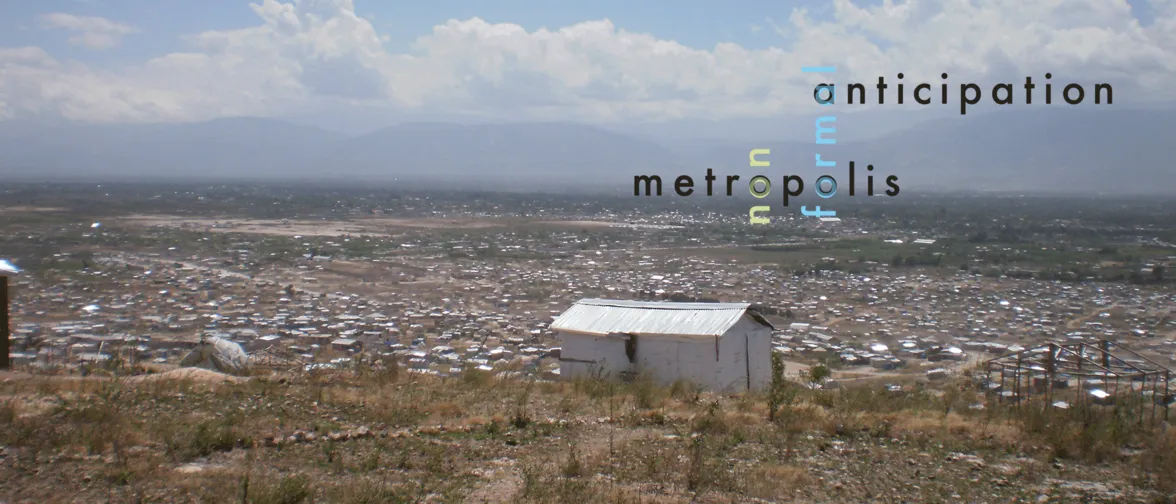
Metropolis nonformal
Anticipation
Symposium launching the UN-Habitat Hub on Informal Urbanism, Sophiensaal, Sophienstr. 6, Munich
20.-23. November 2013
Beschreibung
Slum, Bidonville oder Favela - unser Vokabular für informelle Siedlungen betont ihren ausgegrenzten Status, nicht aber ihre beachtliche Dynamik, moralische Legitimität und weltweite Verbreitung. In den letzten hundert Jahren hat der Bau ungeplanter Viertel an den Stadträndern rapide zugenommen. Etwa ein Drittel der Stadtbevölkerung lebt heutzutage dort, in den kommenden Jahrzehnten wird es die Mehrheit der jungen Stadtbewohner sein. Welche Rolle können Planer und Entwerfer in Städten einnehmen, in denen jeder ein Städtebauer ist? Eine neue Generation von Entwerfern sieht informelle Siedlungen nicht mehr als Störfaktor, sondern als mutige Antwort auf die Unfähigkeit der Regierungen, Wohnraum zu schaffen, mit eigenem urbanen Potenzial.
Beim Symposium "Metropolis Nonformal - Landscape, Infrastructure and Urbanism in the Global South" an der Technischen Universität München diskutieren am 13. und 14. Oktober 2011 renommierte Experten unter anderem aus Deutschland, Brasilien, Kenia und den USA neue Konzepte und Praxisbeispiele im Umgang mit informellen Stadtvierteln.
Programm
| 17:00 | Reception | |
| 18:00 | Claudio Acioly: The Nonformal City
|
| 09:00 | Introduction | |
| Regine Keller: Welcome by the vice president of TUM?Christian Werthmann: Metropolis Nonformal - Landscape, Infrastructure and Urbanism in the Global South | ||
| 09:30 | Community | |
| Phillip Thompson: Participation and Social Engineering Flavio Janches: Whose City is it? Design Strategies for Marginalized Communities in Buenos Aires?Moderator: Hubert Klumpner | ||
| 11:30 | Productivity | |
| Gabriel Duarte: Angolan and Brazilian Favelas Arthur Adeya: Productive Public Space in Kibera, Nairobi Moderator: Phillip Thompson | ||
| 13:00 | Lunch Break | |
| 14:00 | Fluidity | |
| Fernando de Mello Franco: Watery Voids, São Paulo Anuradha Mathur: SOAK, Mumbai Moderator: Gabriel Duarte | ||
| 16:00 | Mobility | |
| Hubert Klumpner: Scaling Caracas’ Magic Mountain Alejandro Echeverri: Transportation, Education and Public Space in Medellin Moderator: Fernando de Mello Franco | ||
| 17:30 | Final | |
| Oliver Heiss, Werner Lang, Regine Keller, Udo Weilacher, Sophie Wolfrum Moderator: Christian Werthmann | ||
| 18:30 | Farewell, Get-Together
|
Curator
Christian Werthmann,
TUM-IAS Hans Fischer Senior Fellow (TUM Institute for Advanced Study),
Professor of Landscape Architecture and Design, Leibniz University Hannover
Hosted by:
Regine Keller, TUM in collaboration with UN-Habitat
Supported by
UN-Habitat – Claudio Acioly Jr., Head Capacity Development Unit, Housing & Urban Management Expert
TUM Institute for Advanced Study (TUM-IAS) – Director Gerhard Abstreiter
International Center, TUM
DFG - Deutsche Forschungsgemeinschaft
TUM Graduate School - Graduate Center Architecture
Bayerische Architektenkammer
CAD-Solutions – Graphisoft
Bruns Pflanzen-Export GmbH & Co. KG
Südhausbau KG
Organisation
Juliane Schneegans, coordinator of the symposium
Sigrid Wagner, event manager/web coordinator of TUM-IAS
Tatjana Steinberger, program manager of TUM-IAS
Asa Isacson, UN Habitat
Christina Milos, Leibniz University Hannover
Publication
Nonformal urbanization will be the dominant mode of urban growth in the coming decades. The results of this growth go by many well-known names, including: slums, favelas, and shantytowns. The precarious conditions of these settlements, excluded from formal legal, social, and infrastructural systems, present a central challenge—and opportunity—in our current and future cities. Short texts explain a range of projects and initiatives, complimented by photographs and personal insights, to present a diversity of responses to the global phenomenon known here as “Metropolis Nonformal”.
Metropolis Nonformal
Christian Werthmann and Jessica Bridger
ORO Applied Research + Design, 2016
240 Seiten
Englisch
ISBN 978-1-940743-14-1
Video Documentation
More Videos on vimeo